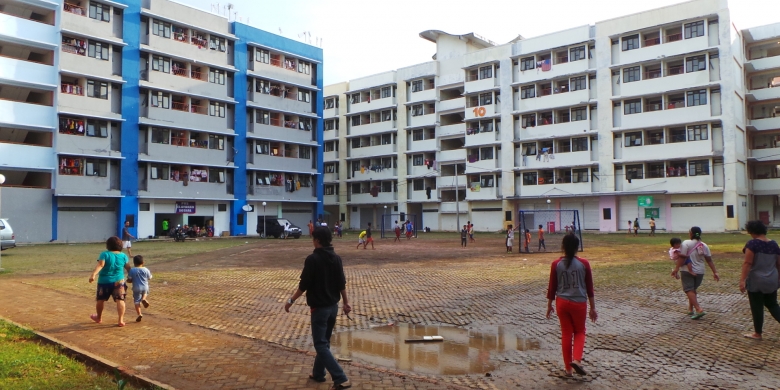Eviction and resettlement are common for the urban poor of Indonesia.
Families move to cities such as Jakarta in search of work or education. They search for empty land, often along flood plains, and build semi-formal homes using timber, metal sheets, and recycled waste.
These simple structures provide shelter, protection, and the opportunity to live and raise a family near the city. Young men find work in the factories or scavenge and sell waste, creating a local industry of recycling. Mothers develop small businesses and struggle to provide food and medicine to their children. Waste and drinking water lay side by side and over time the informal settlement grows into a vast maze of tin shacks with hundreds and thousands of residents.
But eventually each growing community is overturned. The crowding and poor sanitation of urban slums pose threats to neighboring communities and one by one the informal settlements are demolished. Families who had struggled for years to set up their homes, watch them razed by bulldozers in a single day. While there may be warnings in advance, most families have nowhere else to go. It is only after the bulldozers leave that they carry their possessions to another slum to continue the cycle.
Such was the case for residents along the banks of the Pluit water reservoir in Jakarta.
As one resident shared, "It was a very painful moment for us to see the authorities moving our belongings and demolishing our houses."
In this case, however, residents were resettled into government housing facilities, small units in a six-story apartment complex at Rusunawa Marunda. While the space is much more organized and well planned, residents here must pay a fee and life remains a daily struggle to provide for family and avoid eviction.
Recently, Five Talents began work in Rusunawa Marunda through its local partner Gerharti. The aim is to introduce savings and financial services to small business-women in an effort to uplift their condition.
Women are recruited from different business backgrounds and unite themselves together to save and to produce the same product. The cooperative business arrangement is distinct from most of Five Talents other savings programs. While the work is in its earlier stages, participants are already witnessing great results. Click here to read stories of transformation from Marunda.



